2016 Subaru WRX: Five Thousand Miles Later

You may remember my decision three months ago to replace my aging Cadillac STS with a brand-new 2016 Subaru WRX. The “avoid highways” option has been selected on Google Maps ever since, as evidenced by the WRX’s above-average odometer reading. It’s not my fault that the Subie commands a twistier route every time I start it up.
However, this relationship between the WRX and me has not been without its quirks. After making a few payments and driving 5,000 miles, I’ve emerged from the honeymoon period to take a step back and evaluate this new marriage. Let’s take a look at the good, the bad, and the annoying.
The WRX beat out the Ford Focus ST as my daily driver of choice based on the availability of all-wheel drive, better seats, and a some brand loyalty sprinkled in. I dropped off the Caddy and picked up the WRX about an hour away from home on a rainy October night. It was quickly apparent I had given up my sofa on wheels in exchange for an all-access pass to Six Flags. The handling of the WRX was tight and the Dunlop Sport Maxx RT tires cut through the steady stream of water atop the rain-soaked tarmac.
The next few weeks consisted of some local commuting and a trip to Asheville, NC to give the WRX some room to stretch its legs. Four adults and a couple of bags were packed into the WRX as we headed off to the mountains. The first leg of the trip involved some highway driving and a Cracker Barrel stop, after which we fueled up and explored the twisties that lead up to the peak of Mount Mitchell.
We hit the Blue Ridge Parkway and climbed up the mountain with ease. The curvy roads were not a challenge for the chassis and suspension, and the predictable power band of the FA20 flat four provided confidence when passing lesser vehicles. According to the onboard computer, we averaged just a tick over 30 mpg for the highway portion of our drive and dropped down to 26 mpg as we climbed the mountain.
The fuel economy has been generous overall. Highway trips running at 75 mph will return an average of 30 mpg. Spirited drives on the local back roads will bring it down closer to 22 mpg. Commuting around town returns 25 mpg.
Inside, the plastics feel cheap and the surfaces love to pick up dust and other particles. I’m very happy with the driver’s seat, especially now that it’s been fully broken in and proven its worth on 300 mile trips. The backseat is expectedly tighter than the STS, but it can fit two adults comfortably. Adding a third person is possible — but not recommended. The only interior feature I really miss from the Cadillac is the auto-up windows for all four doors. The WRX only allows auto-up on the driver’s window. Flipping that coin, the small quarter windows on the front doors are fantastic in the WRX. They were not something I paid attention to during my car search but I’ve come to appreciate how open they make the cabin feel.
The biggest pain point of the car: the base-spec Starlink infotainment system. Luckily, I am not much of an audiophile because the system is crap. It’s slow to start up and the selecting one of the soft buttons takes me back to the days of wanting to punch Bill Gates for the disaster that was Windows ME. The Bluetooth interface is buggy and takes anywhere from 30 to 40 seconds to connect to my phone once the car is started. Most of my listening is devoted to podcasts with the occasional song thrown in. The Bluetooth connection often drops in the middle of podcast and fails to reconnect or reconnects with a loss in quality.
The volume control starts at 0 things and ends at 40 things (take that, Spinal Tap), but it needs to be turned up to 25 things before you can figure out if its playing anything at all. Passing anything over 34 units of thing will cause the speakers to emit horrendous crackly tones. Adding a new Bluetooth device requires the car to be stopped so make sure all your friends are synced up before heading out on a road trip. The auxiliary and USB connection in the center console are handy but I’ve relegated phone charging duties to the cigarette adapter because the built-in USB port is underpowered and plugging anything into it causes the head unit to freak out if the same device is already connected via Bluetooth. The only shining star of the whole infotainment system is the backup camera: it comes up quickly and shows a clear image, day or night.
The infotainment system stands out as my biggest pet peeve of the car. There are a few other items that could use improvement but they are mostly annoyances. The cable-driven shifter feels sloppy at times and already has me exploring upgrade options that will shifts more crisp and shorten the throws. The clutch pedal is firm and not unlike my Legacy GT. However, over the past few hundred miles, it has developed a grittiness that I plan on bringing up with the service advisor when I take it in for an oil change. I fear that the throwout bearing might be the culprit as I’ve experienced similar symptoms with other Subarus with that particular issue. It also might be as easy as cleaning up some dirt and debris from the pedal assembly and throwing it some grease.
Once you get past the sloppiness of the shifter, the transmission is quite enjoyable. First gear is short and took a little getting used. The car takes off from a stop quickly and torque comes on smooth as you shift through the first few gears. Some may complain the torque curve is too predictable but I’ve grown to appreciate it, even with its occasional dip in power delivery in the 4,000 to 4,500 rpm range. I am quite happy with the stock power of the WRX but my modifying habits are still alive and well. COBB Tuning is calling my name.
The brakes are a parts bin job and are almost entirely lifted from the previous generation Legacy GT. I found them to be competent in the Legacy and they’ve done a good job in the WRX. They even stayed cool as we dropped 4,000 feet in altitude. I have aspirations to get the WRX on track once it warms up and will be swapping out to grabbier pads for a little insurance per the recommendation of resident racer Jack Baruth.
The WRX puts a smile on my face every time I drive it and I look forward to lots of miles this year. I have plans for more mountain trips and some track visits as schedule allows. The WRX gets a bit more attention on the road than the Cadillac and waves from other Subaru drivers are almost a daily occurrence.
And as far as the horrible infotainment is concerned, there’s a cure: turn it off. The flat four sounds better anyway.

More by Bozi Tatarevic
Latest Car Reviews
Read moreLatest Product Reviews
Read moreRecent Comments
- ToolGuy The only way this makes sense to me (still looking) is if it is tied to the realization that they have a capital issue (cash crunch) which is getting in the way of their plans.
- Jeff I do think this is a good thing. Teaching salespeople how to interact with the customer and teaching them some of the features and technical stuff of the vehicles is important.
- MKizzy If Tesla stops maintaining and expanding the Superchargers at current levels, imagine the chaos as more EV owners with high expectations visit crowded and no longer reliable Superchargers.It feels like at this point, Musk is nearly bored enough with Tesla and EVs in general to literally take his ball and going home.
- Incog99 I bought a brand new 4 on the floor 240SX coupe in 1989 in pearl green. I drove it almost 200k miles, put in a killer sound system and never wish I sold it. I graduated to an Infiniti Q45 next and that tank was amazing.
- CanadaCraig As an aside... you are so incredibly vulnerable as you're sitting there WAITING for you EV to charge. It freaks me out.



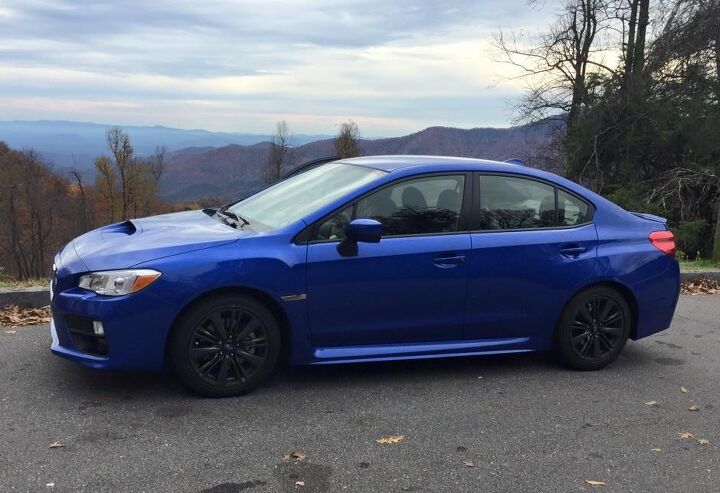



















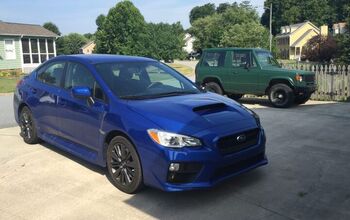
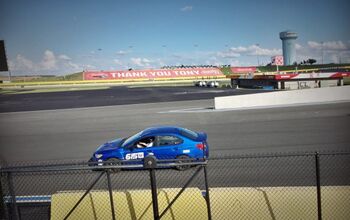
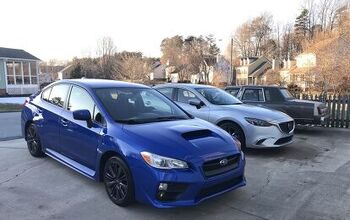











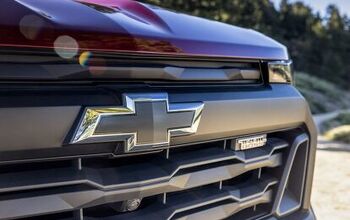
Comments
Join the conversation
Not at all a fan of those black wheels. I have already seen a few late model cars with those wheels and the paint was already starting to flake off in spots revealing the alloy wheel underneath.
Bozi Great reading and I couldn't agree with you more regarding your review of the Starlink system. I just picked up my new WRX two weeks ago and LOVE the car but I absolutely hate Starlink. Went into Bestbuy and was able to plug in my iPhone into a Pioneer Apple CarPlay stereo and instantly all my music and contacts were there. I wish Starlink was that responsive. Thanks for your review.